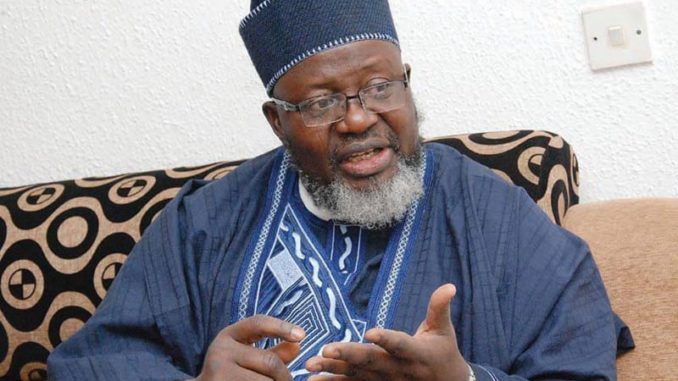
Exactly 100 days since PREMIUM TIMES exposed Nigeria’s communications minister, Adebayo Shittu, for skipping the mandatory one-year national youth service, President Muhammadu Buhari has failed to act on the matter and is still keeping the official.
This newspaper published details of its investigation on September 20, showing how Mr Shittu deliberately shunned the service, which is organised by the National Youths Service Corps (NYSC).
Activists described Mr Buhari’s inaction on the issue as “demoralising”, and said it was a negative commentary on his government’s claims to morality.
Another cabinet minister, Kemi Adeosun, who was Mr Buhari’s finance minister, was earlier in the year busted by PREMIUM TIMES for a similar offence, and for forging a document to cover it.
Mrs Adeosun was eventually eased out of her post following public outcry.
But in the case of Mr Shittu, the government has not taken action, despite the minister’s admission of the offence.
NYSC management had also discredited the minister’s attempt to rationalise his action.
Mr Shittu admitted to PREMIUM TIMES that he did not serve but claimed he thought his first political post after graduation sufficed as national service.
The ruling All Progressives Congress (APC), in October, disqualified Mr Shittu from the governorship race of his native Oyo State, citing his absconding from the national service as the reason.
The party, however, did not take any step to have the minister sacked from government.
Mr Shittu’s Violation
The minister graduated from the then University of Ife (now Obafemi Awolowo University, Ile-Ife) at the age of 25 in 1978.
Mr Shittu attended the Nigerian Law School immediately after graduation, qualifying as a lawyer in 1979.
However, instead of participating in the national service, he got elected into the Oyo State House of Assembly in the 1979 general elections.
Months of discreet checks at the NYSC headquarters showed that the minister never presented himself for service after graduation.
Skipping the compulsory national service is an offence under the NYSC law, punishable with up to 12 months imprisonment.
Section 2 (1) of the NYSC Act mandates all Nigerians who earn degrees or higher national diplomas from tertiary institutions in Nigerian and abroad (effective 1972/73 session) to participate in the scheme.
Employers are mandated by law to request NYSC certificate of national service as part of the conditions for hiring.
Exempted by the law are those who graduated after their 30th birthday, persons with national honours and individuals who serve in the military and intelligence organisations.
Mr Shittu’s ‘Defence’
The minister said he deliberately skipped the NYSC scheme because he was convinced that his membership of the state assembly was itself a “service.”
“The constitution provides for the qualification needed for state assembly members, NYSC is not there,” Mr Shittu said at the time. “I didn’t need it to become a member of the state assembly, and that is already a service.”
Mr Shittu disagreed with our reporter who laboured to explain to him that the NYSC Act makes participation in the scheme mandatory for all graduates like him and that election or appointment to political office does not qualify as a basis for exemption.
Lawyers described the minister’s defence as ridiculous.
The NYSC management also repudiated Mr Shittu’s interpretation of its law, saying the minister’s state assembly membership could not have relieved him of serving the country.
“Serving in the National (or state) Assembly is not one of them (conditions for exemption from national service),” NYSC spokesperson, Adenike Adeyemi, told the Nigerian Tribune, after PREMIUM TIMES broke the story.
Wrong Signals
Anti-corruption campaigners say Mr Buhari’s inaction on the matter sends wrongs signals about the genuineness of his government’s commitment to ethics and values.
The Executive Director of the Civil Society Legislative Advocacy Centre (CISLAC), Auwal Rafsanjani, said by his inaction, President Buhari has shown that the government has scapegoats in its anti-corruption campaign.
He said the action of persons such as Mr Shittu should be treated the same way as financial corruption as it also amounts to a contravention of extant laws.
“[It] is a very troubling development. It sends wrong signals. Sometimes you wonder what kind of due diligence took place before the president constituted his cabinet, which we shouldn’t forget took six months to put together. Sometimes, of course, some of these things don’t get detected at the beginning but when they do through media or civil society intervention any president who wants to be taken seriously must act,” said Chido Onumah, Coordinator of the African Centre for Media & Information Literacy (AFRICMIL).
Another activist, Adetokumbo Mumini, who is the Executive Director of the Socio-Economic Rights and Accountability Project (SERAP), said the government must take action on the lingering issue.
He said “any issue that touches on integrity is not to be delayed. It should be treated with despatch and with all the attention it deserved”.
END

Be the first to comment